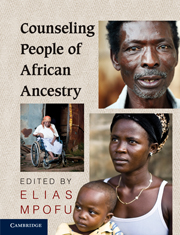Book contents
- Frontmatter
- Contents
- Contributors
- About the Editor
- Editorial Board
- Foreword
- Preface
- Acknowledgments
- PART 1 FOUNDATIONS OF COUNSELING IN AFRICAN SETTINGS
- PART 2 CONTEXTS OF COUNSELING
- PART 3 COUNSELING APPLICATIONS
- 15 Counseling for Trauma
- 16 HIV and AIDS Counseling
- 17 Substance Use Disorder Counseling
- 18 Career Counseling People of African Ancestry
- 19 Counseling People with Disabilities
- PART 4 THE FUTURE OF COUNSELING IN AFRICAN HERITAGE SETTINGS
- Counseling People of African Ancestry Multiple Choice Answers
- Index
15 - Counseling for Trauma
Published online by Cambridge University Press: 05 August 2011
- Frontmatter
- Contents
- Contributors
- About the Editor
- Editorial Board
- Foreword
- Preface
- Acknowledgments
- PART 1 FOUNDATIONS OF COUNSELING IN AFRICAN SETTINGS
- PART 2 CONTEXTS OF COUNSELING
- PART 3 COUNSELING APPLICATIONS
- 15 Counseling for Trauma
- 16 HIV and AIDS Counseling
- 17 Substance Use Disorder Counseling
- 18 Career Counseling People of African Ancestry
- 19 Counseling People with Disabilities
- PART 4 THE FUTURE OF COUNSELING IN AFRICAN HERITAGE SETTINGS
- Counseling People of African Ancestry Multiple Choice Answers
- Index
Summary
OVERVIEW. Very intense emotions can be evoked in individuals who experience traumatic events such as being assaulted or raped, seeing a murder, being involved in a motor vehicle accident, or having one's home washed away in a flood. In this chapter, we focus on how counselors can recognize when clients have been exposed to trauma and the common symptoms they may display. We also look at how the kind of help counselors can give depends on the circumstances and the context in which the client is seen for counseling. We review a range of interventions from immediate help in stabilizing individuals in the immediate aftermath to the treatment of posttraumatic stress disorder (PTSD) that persists months or even years after the traumatic event took place, and how these interventions have been used in African contexts.
LEARNING OBJECTIVES
By the end of the chapter, the reader should be able to:
Identify and describe the kinds of traumatizing events that give rise to stress reactions such as PTSD.
Explain the range of typical psychological effects of being exposed to such traumatizing events.
Discuss individual differences among people in the way they are affected by traumatic events.
Critically discuss different ways that counselors can help people experiencing the immediate or long-term effects of exposure to traumatizing events.
Critically discuss the role of trauma interventions in communities exposed to man-made or natural disasters.
- Type
- Chapter
- Information
- Counseling People of African Ancestry , pp. 229 - 248Publisher: Cambridge University PressPrint publication year: 2011

